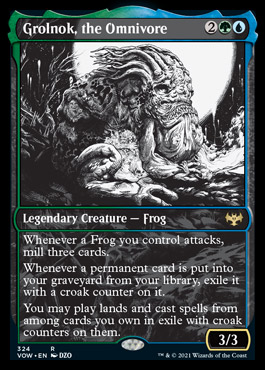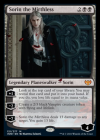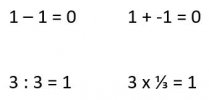Uh... wow. There's a lot to pick apart here. Just because it works for you (or you think it works for you), doesn't mean it's better if they called everything kicker.
Yes. The word "kicker" conveys no flavor at all. It's a word that mechanically describes what happens (using this meaning of the word: an extra clause in a contract), but it doesn't even convey a lot of information, just that there is someway to have the card do... more? Compare this, for example, to "entwine", which literally is just kicker. The word "entwine", however, conveys that you are winding or twisting something together (in this case two different effects).
I hard disagree with this notion, both the conclusion, and the way you try are throwing mechanic names under the bus. The thing is, WotC isn't using
just the name of a mechanic to sell the flavor, it's
also using the name of the mechanic to sell the flavor, in conjunction with other things. First and foremost the way the mechanic works, obviously, but also through art direction, for example. MaRo has talked a lot about grokkability, in particular in this article, from which I will quote this important section:
What this comes down to, is that every little bit that helps players to more readily 'grok' a card, makes that card easier to play. There are a lot of things WotC can do to make a card more grokkable, and one of those things is using mechanic names that match with what the mechanic does. The problem is that that only works if the mechanic isn't too broad, which is one of the points MaRo makes in my previously linked article.
Debatable. Remember that kicker is very broad, and doesn't convey a lot of information beyond knowing the card has some additional cost anyway. You don't know what cost (could be mana, or sacrificing something, or paying life, etc.), and you don't know what the benefit is going to be. Heck, there are even actual kicker cards where paying the kicker removes a negative quality rather than adding something (looking at you
Skizzik). In short, the keyword kicker itself doesn't reduce mental load by a lot to begin with. And sure, we can't expect people to know every keyword by heart, but if someone
does know a mechanic (that is not kicker), they can grasp what that card does a lot quicker than with kicker. E.g. if I see 'entwine' on a card, I immediately know that it's a modal spell with two options, and that I can choose both if I pay the entwine cost. Had it been kicker, I would have had to read the entire card to see what the kicker does.
That's a cynic take that ignores all the arguments (which you call excuses) in favor of not using kicker (or split cards) for almost everything. Even if you are right, and having unique mechanics actually sells sets (which is a debatable statement, looking at the success of Time Spiral, Dominaria, and Modern Horizons, just to name a few sets (years or even decades apart) that feature a lot of reused mechanics), isn't it a good thing if Magic sells better? Obviously that's a different discussion, but I kind of hate the argument "this is just WotC trying to sell more cards" when we are talking about a design/development choice that doesn't even increase the price of Magic. There's lots of things this argument
can be applied to (like the mythic rarity, or the Universes Beyond line), but unique mechanic names isn't one of them in my mind.
I mean, this is a fair sentiment to have...
...but that doesn't mean unique mechanic names that are subsets of kicker (or split cards) are useless. Sorry for the rant, nothing personal, apparently it's just something I care about

For what it's worth, I do think 'cleave' looks pretty ugly.



